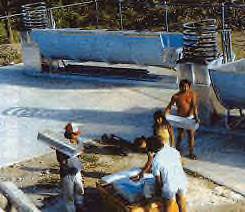
Village Sized Ice Maker

Appropriate Technology
The October 31 Time Has several articles in a section The Future of Energy. What impressed me was the tone of the pieces; roughly "what a fine mess we've gotten ourselves into."
In the article How to Kick the Oil HabitRichard Heinberg was quoted liberally. Heinberg has written two recent books about the oil crisis: The Party's Over: Oil, War and the Fate of Industrial Societies and Powerdown: Options and Actions for a Post-Carbon World . Both books are a bucket of cold water thrown over our oil-addicted culture.
It seemed a little strange that Time was publishing such a pessamistic, albeit "reality-based" coverage. Nevertheless, Time seems to be endorsing the view that free market economics are probably inadequate to manage a problem of this magnitued. The article quotes Heinberg:
"Price signals, come much too late, and we will endure a tremendous amount of economic and social hardship that could have been averted if we'd acted sooner. We could see the equivilant of the Great Depression, fueled by extreme oil and natural-gas prices."
I was dealing my own personal energy crisis shortly after reading Time. I'd gotten a load of firewood and it was a mess. Unsplit and unsplitable species made up the bulk of the load, and naturally I felt the cord skimpy.
Something for sure, the transitions to alternative forms of energy aren't going to be easy. Technology has an allure and it's interesting to think about appropriate technologies for the developing world. Some things, like making automobiles, are super captial-intensive enterprizes; while other technologies are quite simple. Both kinds are needed.
The picture is of a village sized solar ice maker. At the Web site you can add it to your shopping basket. The Sustainable Village is "a new organization with old and deep roots in sustainability. Steve Troy, one of the pioneers in appropriate technology, began working in the development field in 1966. Since that time he has founded or co-founded 20 businesses including Jade Mountain, Real Goods, and Planetary Solutions. He created The Sustainable Village specifically to do this important work in developing countries." It's fun to look around to see the products offered and the business model is fascinating too.
Another business that creates wonderful products for the developing world, using apparently standard business models is Vestergaad Frandsen. The company makes and markets disease control textiles. LifeStraw has the potential to reduce the incidence of water borne diseases worldwide.
Other organizations that support technological development take a more non-profit sector approach like KickStart. But even here developing markets for their products is essential. Sodis is an extremely simple technology for water purification; getting the information out is the essential business for Sodis.
Solar Lights for Africa raises money to supply off the shelf solar technology. There's Pittsburgh connection to this worthwile charity. Such charitable work clearly has a place, but it's worth noting the contrast between the model of business plan of Solar Lights for Africa and the others in that they don't seem to employ market mechanisms.
In the information and communications arena is Inveneo. One of their projects, a village telephone service, stands out because it employs solar energy with a pedal power back up. Making systems robust is something to pay attention to regardless of scale.
Here in America we'll have to explore new energy technologies. By looking to the developing world, we can catch a glimpse of possible futures.
No comments:
Post a Comment